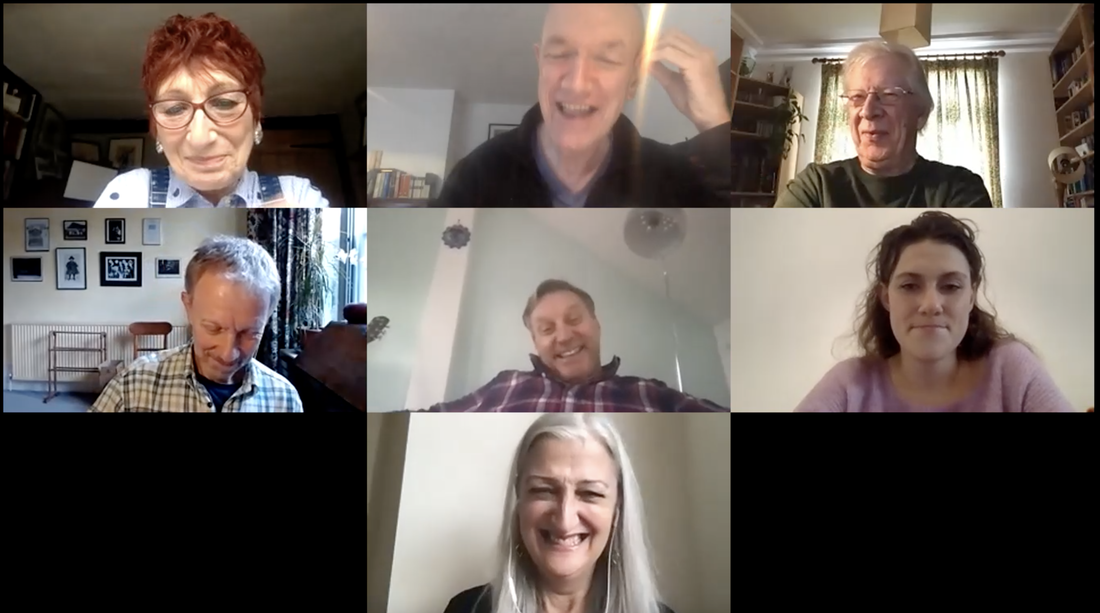|
October 29th, 2021. Present (row-by-row from top left): Fiz Marcus; Colin Ellwood; David Whitworth; Jamie Newall; John Chancer; Amelie Eberle; Susan Raasay
Firstly and briefly, Daniel Ockrent’s short actor-musician ensemble piece, Seventeen. Seven brothers meet to mark the seventeenth birthday of the youngest, Esteban. The dangerous mammal in the room is the legend that the seventh son of a seventh son of a seventh son – which Esteban is – will on his seventeenth birthday turn into a werewolf. Over the course of fifteen or so minutes, this ‘unspoken’ fear slowly manifests and is addressed. At Esteban’s request his brothers tie him up and arm themselves with knives. It’s a beautiful simple ensemble take, deftly told and progressively more disturbing as the very real precautions and psychological effects take hold. Esteban launches obsessively into prayer, and what initially seems an arch and playful piece enacts a transformation of its own, into the experience of confronting - as a family, a collective – the prospect, however remote, of a terrible reality. Then the great Spanish dramatist Alfonso Sastre’s Ululame, inspired by Edgar Alan Poe’s poem of the same name that allegorically and in mystical terms explores the poet’s response to the death of his wife. Sastre brilliantly projects this strange psychological journey onto the biographical mystery of Poe’s movements immediately prior to his death in Baltimore. He was stopping off there while on a railway journey from Virginia to New York to retrieve some valuables from his beloved Aunt’s (and mother in law’s) home in New York, prior to his marriage of convenience to a childhood friend and fan. No-one knows with any certainty what happened to him in the two days he went missing before being discovered in an alcoholic stupor and in someone else's clothes. In the play Poe is already fragile with the cognitive and physical effects of alcoholism and opium addiction as he sets out alone. Beautifully and evocatively translated by Paul Rankin, Sastre captures Poe’s sense of self-estrangement and dislocation through tortuous circumlocutions and conversational false starts and misunderstandings. Once he reaches Baltimore, at election time with brass bands playing and all kinds of election shenanigans going on, the chaotic events of an incipient binge are filtered through the writer’s alcohol-induced psychotic state, and the inner ‘Ululame’ trajectory is projected onto the experience. For all its delusional, dream quality, the result is a hugely telling enactment of the madness of an estranged world and of the chaos of grief and loss. Poe is emotionally alive during the Baltimore psychosis since psychosis is surely an excess of meaning, and meaning is both something we all yearn for and of which grief deprives us. We share Poe’s distorted experience even as we glimpse beyond it the real chaos and randomness of his Baltimore exploits. Ultimately he returns to the sense of frozen dislocation that he experienced prior. Beyond that is his death, and then the constancy of his devoted old aunt in visiting his grave. Sastre’s Poe is a writer addicted to his visions as much as to alcohol, the latter being a comfort blanket against the cold blasts of reality and mourning. Without the visions and the meanings they validate - and that are symbolised by the possibility of reconnection to the spirit of his beloved wife – he is nothing. The play is a celebration of the unique imagination of Poe, haunted by his stories and poems - all of which seemed to grow out of his psyche’s imperatives - as well as a savouring of the fragility and innocence of the artist and of the reality of love, even where it cannot be properly received (as is the case with his Aunt''s long-suffering devotion to him). The play is both tragic and deeply funny, as Poe is buffeted through the Baltimore night like a hapless Buster Keaton, encountering apparently random lunatics and venal election agents and a gallery of grotesque characters as he repeatedly tries to make his train connection. And the (in reality) missing clothes? Corrupt election agents used to pay people to vote repeatedly, changing their clothes in the hope they wouldn't be spotted by the authorities. The money was often spent on drink. Read with relish and the group loved the play
0 Comments
Leave a Reply. |
INDEX of dates:
INDEX of playwrights and plays:
INDEX of contributors:
|

 RSS Feed
RSS Feed
